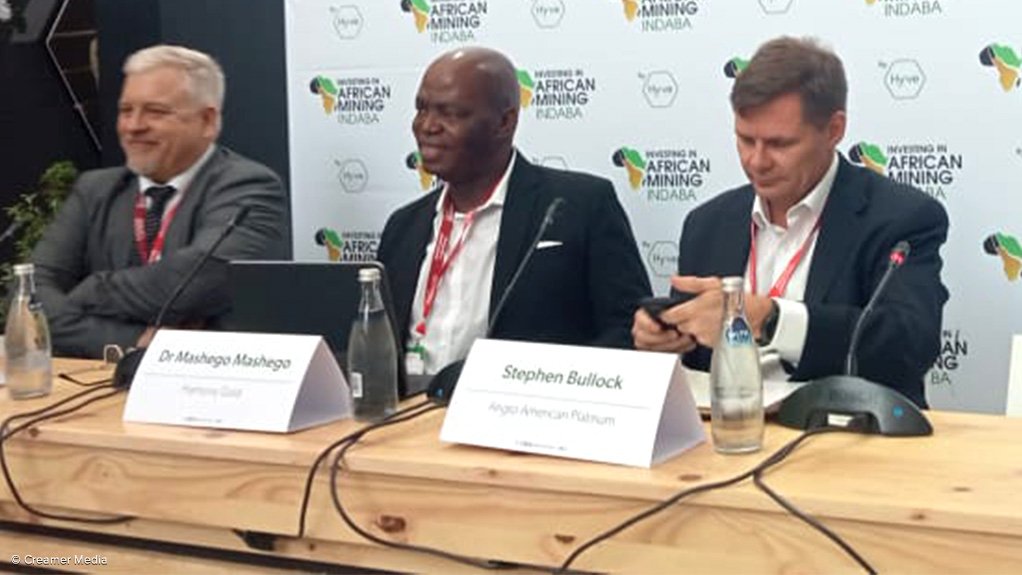Procurement extortion, copper theft serious issues for South African miners
One of the major crime problems facing South African mining companies is that of the so-called “construction mafias”, or perhaps more accurately (as far as mining is concerned) “procurement mafias”. That is, organised crime gangs seeking to extort procurement contracts from mining companies, through threats of violence, or actual violence.
This was highlighted on Monday, at a press briefing on the first day of the Investing in African Mining Indaba 2024 conference in Cape Town. The press conference was organised by the Investing in African Mining Indaba.
One of the most shocking experiences was that of Richards Bay Minerals (RBM) where two company GMs have been assassinated since 2016, over procurement contracts. It was in 2019 that RBM decided that it itself had to investigate the crime that afflicted it, reported Rio Tinto Iron & Titanium Africa (under which RBM falls) MD Werner Duvenhage at the briefing. It was discovered that organised crime had infiltrated itself around and into the company. Management realised that it could not handle this, on its own. It had received “excellent support” from the national government and from the South African Police Service (SAPS), also at the national level. The local SAPS in Richards Bay, however, also suffered from corruption.
While the platinum group metals (PGMs) mining sector did not suffer from the problem of illegal mining, it did, like RBM, have to deal with the procurement mafias, pointed out Anglo American Platinum (Amplats) sustainable impact head Stephen Bullock. As with RBM, these criminals used local communities as fronts for their extortion demands.
Tactics used by these gangs included so-called “community blockages”, preventing access to, or egress from, mines, thereby disrupting production and delivery. In cooperation with the SAPS and other authorities, Amplats had responded to these by insisting on the upholding of the Rule of Law, intelligence gathering, validating the information gathered, ensuring the security of its personnel, and ensuring the security of its infrastructure. Additionally, the company had made it clear that anyone who blocked the access roads to its operations would never receive any contract from it. These measures have led, in the period 2022/23, to a 70% reduction in “community blockages”.
Further, the company had centralised its procurement processes, taking them away from its operations. This meant that “mafia” intimidation tactics directed against staff at those operations no longer bore fruit, and the group had seen a decline in such tactics.
Another problem faced by Amplats has been copper theft. This has been both a direct problem – the theft of copper cabling from the company’s own properties – and an indirect problem (the theft of copper cabling from Transnet’s railway lines, immobilising the trains carrying the miner’s output). Consequently, Amplats was also working with Transnet, on this problem. (The same approach as outlined above also applied to the copper theft problem.)
And there was theft of the PGMs that it produced.
The miner was also working with the authorities and other businesses, at the national level, to strengthen investigations into, and prosecutions of, these mining-targeting crimes, Bullock assured. The company was working with the SAPS at national and provincial levels to increase the number of police offices “on-the-ground” in the mining areas. Amplats was also working internationally, to track stolen PGMs.
Conviction rates for criminals arrested for targeting RBM had not been very good initially, Duvenhage reported. But things had changed once the company had started working with the national SAPS and other authorities. Now there were dedicated investigative officers and prosecutors of “the highest calibre”. There had, as yet, been no “strong convictions”, but he had “high confidence” that this would happen, with cases now being prosecuted, probably starting later this year.
Bullock highlighted that the prosecution of “significant players” in organised crime could take three years. That was why there was a need for dedicated investigators and prosecutors.
Article Enquiry
Email Article
Save Article
Feedback
To advertise email advertising@creamermedia.co.za or click here
Press Office
Announcements
What's On
Subscribe to improve your user experience...
Option 1 (equivalent of R125 a month):
Receive a weekly copy of Creamer Media's Engineering News & Mining Weekly magazine
(print copy for those in South Africa and e-magazine for those outside of South Africa)
Receive daily email newsletters
Access to full search results
Access archive of magazine back copies
Access to Projects in Progress
Access to ONE Research Report of your choice in PDF format
Option 2 (equivalent of R375 a month):
All benefits from Option 1
PLUS
Access to Creamer Media's Research Channel Africa for ALL Research Reports, in PDF format, on various industrial and mining sectors
including Electricity; Water; Energy Transition; Hydrogen; Roads, Rail and Ports; Coal; Gold; Platinum; Battery Metals; etc.
Already a subscriber?
Forgotten your password?
Receive weekly copy of Creamer Media's Engineering News & Mining Weekly magazine (print copy for those in South Africa and e-magazine for those outside of South Africa)
➕
Recieve daily email newsletters
➕
Access to full search results
➕
Access archive of magazine back copies
➕
Access to Projects in Progress
➕
Access to ONE Research Report of your choice in PDF format
RESEARCH CHANNEL AFRICA
R4500 (equivalent of R375 a month)
SUBSCRIBEAll benefits from Option 1
➕
Access to Creamer Media's Research Channel Africa for ALL Research Reports on various industrial and mining sectors, in PDF format, including on:
Electricity
➕
Water
➕
Energy Transition
➕
Hydrogen
➕
Roads, Rail and Ports
➕
Coal
➕
Gold
➕
Platinum
➕
Battery Metals
➕
etc.
Receive all benefits from Option 1 or Option 2 delivered to numerous people at your company
➕
Multiple User names and Passwords for simultaneous log-ins
➕
Intranet integration access to all in your organisation





















